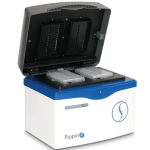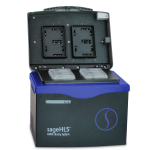Design and synthesis of a minimal bacterial genome
March 2016
Authors:
Clyde A. Hutchison III, Ray-Yuan Chuang, Vladimir N. Noskov, et al.
Info:
Scientists from the J. Craig Venter Institute and other institutes systematically stripped out genes from the Mycoplasma mycoides genome until they were down to the 473 genes necessary for the organism’s survival. They used BluePippin with the PacBio RS II for de novo assembly of the artificial genome.
Citation:
Science 25 Mar 2016: Vol. 351, Issue 6280
DOI: 10.1126/science.aad6253
Hybridization Capture Using RAD Probes (hyRAD), a New Tool for Performing Genomic Analyses on Collection Specimens
March 2016
Authors:
Tomasz Suchan, Camille Pitteloud, Nadezhda S. Gerasimova, Anna Kostikova, Sarah Schmid, Nils Arrigo, Mila Pajkovic, Michał Ronikier, and Nadir Alvarez
Info:
Scientists present a new protocol based on the RAD-seq concept that works more effectively for samples with degraded DNA, such as museum samples. They demonstrate the approach in butterflies and grasshoppers. Pippin Prep was used for size selection of ligation products prior to sequencing.
Citation:
PLoS ONE 11(3): e0151651.
doi:10.1371/journal.pone.0151651
Identification of Human Islet Amyloid Polypeptide as a BACE2 Substrate
February 2016
Authors:
Ingrid C. Rulifson, Ping Cao, Li Miao, David Kopecky, Linda Huang, Ryan D. White, Kim Samayoa, Jonitha Gardner, Xiaosu Wu, Kui Chen, Trace Tsuruda, Oliver Homann, Helene Baribault, Harvey Yamane, Tim Carlson, Jed Wiltzius, Yang Li
Info:
Researchers from Amgen report on a proteolytic enzyme, BACE2, that could potentially have a therapeutic use for treatment of pancreatic amyloid formation caused by Type-2 diabetes. Illumina RNA-seq, with Pippin size selection, was used to test whether BACE would modulate its target proteins in a cellular setting.
Citation:
PLoS ONE 11(2): e0147254
doi:10.1371/journal.pone.0147254
Pitfalls of haplotype phasing from amplicon-based long-read sequencing
February 2016
Authors:
Thomas W. Laver, Richard C. Caswell, Karen A. Moore, Jeremie Poschmann, Matthew B. Johnson, Martina M. Owens, Sian Ellard, Konrad H. Paszkiewicz & Michael N. Weedon
Info:
University of Exeter researchers used long-range PCR and long-read sequencing to phase genetic variants separated by 9 Kb, comparing results from the PacBio and Oxford Nanopore sequencing systems. BluePippin was used for size selection of the PacBio 20 Kb library.
Citation:
Scientific Reports 6, Article number: 21746 (2016)
doi:10.1038/srep21746
Comparison of Sample Preparation Methods Used for the Next-Generation Sequencing of Mycobacterium tuberculosis
February 2016
Authors:
Andrea D. Tyler, Sara Christianson, Natalie C. Knox, Philip Mabon, Joyce Wolfe, Gary Van Domselaar, Morag R. Graham, and Meenu K. Sharma
Info:
In this PLoS One publication, scientists in Manitoba compare the quality of libraries constructed with Illumina’s Nextera and TruSeq protocols for Mycobacterium tuberculosis, which has a particularly challenging genome. They determined that the TruSeq method yielded more uniform data quality and coverage. BluePippin was used for size selection prior to sequencing on a MiSeq.
Citation:
DOI: 10.1371/journal.pone.0148676





